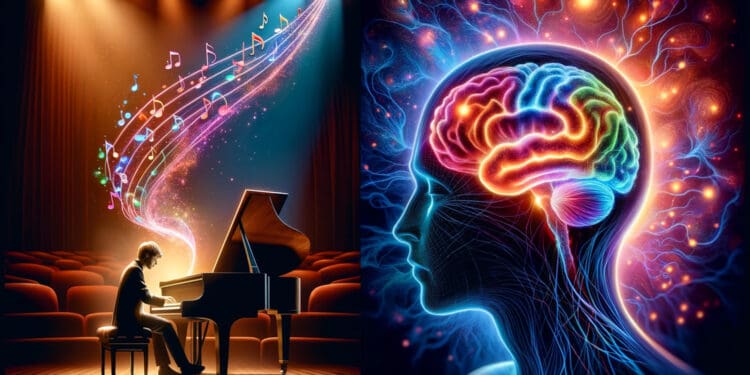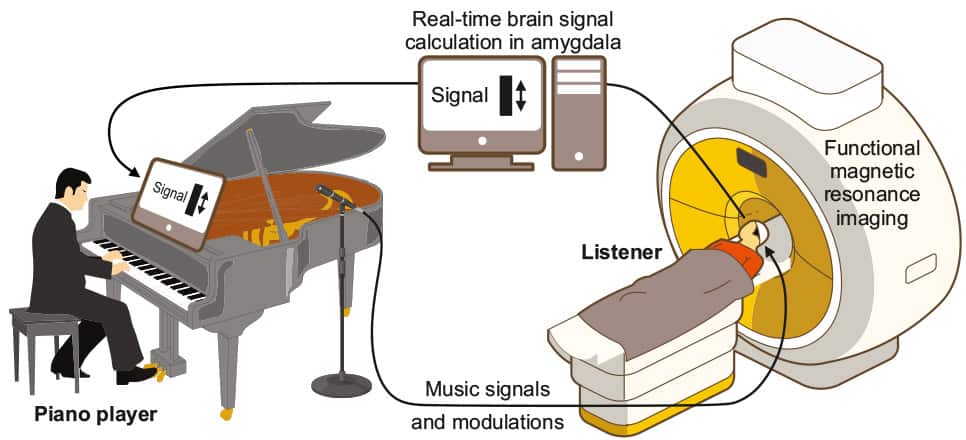Live music strikes a deeper chord in the brain than recorded tunes, study finds
by Eric W. Dolan
February 28, 2024

(Photo credit: OpenAI's DALL·E)
Live music performances evoke a significantly stronger emotional response in the brain compared to recorded music, according to new research published in the Proceedings of the National Academy of Sciences (PNAS). This discovery sheds light on the profound connection between musicians and their audience, potentially rooted in evolutionary factors, offering new insights into our emotional experiences with music.
Music has long been recognized for its powerful emotional effects, capable of evoking a wide range of feelings, from joy to sadness. Previous research has extensively documented how recorded music can stimulate the brain’s emotional and imaginative processes. However, the specific effects of live music performances on the brain remained largely unexplored until now.
Sascha Frühholz, a professor of cognitive and affective neuroscience at University of Zurich, and his colleagues sought to address this gap, investigating how live music, with its dynamic and adaptive qualities, uniquely influences emotional processing in the brain. The researchers conducted an experiment that aimed to explore how live piano performances, as opposed to recorded ones, influence the activity within the amygdala — often referred to as the emotional center of the brain. This experiment’s innovative approach leveraged real-time brain imaging technology to capture the relationships between the performance and the listener’s emotional state.
The study included a carefully selected group of 27 individuals, chosen to represent a broad spectrum of the general population without professional musical training or education. This criterion ensured that the findings would be applicable to the average listener, providing insights into the universal impact of music on emotional processing. The musicians involved were two professional pianists from the Zurich University of the Arts, bringing their expertise and emotional expression to the live performances.
The core of the experimental procedure involved the pianists performing 12 piano pieces, composed expressly for the study to elicit emotional responses ranging from pleasant to unpleasant. These performances were unique in that they were adapted in real-time based on the neurofeedback from the listeners’ amygdala activity, a process facilitated by functional Magnetic Resonance Imaging (fMRI).
This innovative setup allowed the pianist to modify the performance to enhance the emotional impact on the audience. In contrast, the control condition presented the participants with recorded versions of the same pieces, lacking the live feedback loop, to isolate the effect of live performance from the music itself.

The researchers conducted an elaborate experiment in which a pianist changed the live music he or she was playing to intensify the emotional reactions in the amygdala, the emotional center in the brain. (Credit: UZH, Sascha Frühholz)
Frühholz and his colleagues found that live music, compared to its recorded counterpart, elicited significantly stronger and more consistent activity in the amygdala. This enhanced response suggests that live performances evoke a deeper emotional engagement and stimulate a more robust emotional experience in listeners.
Interestingly, emotional stimulation from live music extended beyond the amygdala, prompting a more active exchange of information throughout the whole brain. This indicates that live music doesn’t just intensify emotional reactions but also engages broader cognitive and affective networks. Such engagement points to a comprehensive processing of emotions and suggests that live music might facilitate a more complex integration of emotional and cognitive responses, potentially enhancing the overall listening experience.
“Our study showed that pleasant and unpleasant emotions performed as live music elicited much higher and more consistent activity in the amygdala than recorded music. The live performance also stimulated a more active exchange of information in the whole brain, which points to strong emotional processing in the affective and cognitive parts of the brain,” Frühholz explained
The researchers observed a significant alignment between the audience’s subjective emotional experiences and their brain activity, specifically within the auditory system that assesses music’s acoustic qualities. This synchronization was markedly more pronounced during live performances, underscoring the unique connection forged between musicians and listeners in a live setting. This phenomenon suggests that live music facilitates a shared emotional space where performers and audience members are closely attuned to each other’s emotional states.
Additionally, the study highlighted the adaptive nature of live performances, where musicians can modify their play in real-time based on the audience’s emotional responses. This dynamic interaction was facilitated through a neurofeedback loop, allowing the pianist to adjust the performance to maximize emotional impact. This finding underscores the reciprocal relationship inherent in live music experiences, where the flow of emotional communication between the performer and the audience is continuous and mutually influential.
“Live music is acoustically different from recorded music, and only live settings lead to a close coupling between musical performances and emotional responses in listeners, which is a central mechanism for music as a social entrainment process,” the researchers concluded.
The study touches on the evolutionary roots of music, suggesting that the preference for live music over recorded versions may stem from historical practices of making music with tools and instruments. Despite technological advancements that have made recorded music widely accessible, the social and emotional experience of attending a live concert remains unparalleled.
“This can perhaps be traced back to the evolutionary roots of music,” Frühholz remarked. “People want the emotional experience of live music. We want musicians to take us on an emotional journey with their performances.”
The study, “Live music stimulates the affective brain and emotionally entrains listeners in real time,” was authored by Wiebke Trost, Caitlyn Trevor, Natalia Fernandez, Florence Steiner, and Sascha Frühholz.
Frühholz and his colleagues found that live music, compared to its recorded counterpart, elicited significantly stronger and more consistent activity in the amygdala. This enhanced response suggests that live performances evoke a deeper emotional engagement and stimulate a more robust emotional experience in listeners.
Interestingly, emotional stimulation from live music extended beyond the amygdala, prompting a more active exchange of information throughout the whole brain. This indicates that live music doesn’t just intensify emotional reactions but also engages broader cognitive and affective networks. Such engagement points to a comprehensive processing of emotions and suggests that live music might facilitate a more complex integration of emotional and cognitive responses, potentially enhancing the overall listening experience.
“Our study showed that pleasant and unpleasant emotions performed as live music elicited much higher and more consistent activity in the amygdala than recorded music. The live performance also stimulated a more active exchange of information in the whole brain, which points to strong emotional processing in the affective and cognitive parts of the brain,” Frühholz explained
The researchers observed a significant alignment between the audience’s subjective emotional experiences and their brain activity, specifically within the auditory system that assesses music’s acoustic qualities. This synchronization was markedly more pronounced during live performances, underscoring the unique connection forged between musicians and listeners in a live setting. This phenomenon suggests that live music facilitates a shared emotional space where performers and audience members are closely attuned to each other’s emotional states.
Additionally, the study highlighted the adaptive nature of live performances, where musicians can modify their play in real-time based on the audience’s emotional responses. This dynamic interaction was facilitated through a neurofeedback loop, allowing the pianist to adjust the performance to maximize emotional impact. This finding underscores the reciprocal relationship inherent in live music experiences, where the flow of emotional communication between the performer and the audience is continuous and mutually influential.
“Live music is acoustically different from recorded music, and only live settings lead to a close coupling between musical performances and emotional responses in listeners, which is a central mechanism for music as a social entrainment process,” the researchers concluded.
The study touches on the evolutionary roots of music, suggesting that the preference for live music over recorded versions may stem from historical practices of making music with tools and instruments. Despite technological advancements that have made recorded music widely accessible, the social and emotional experience of attending a live concert remains unparalleled.
“This can perhaps be traced back to the evolutionary roots of music,” Frühholz remarked. “People want the emotional experience of live music. We want musicians to take us on an emotional journey with their performances.”
The study, “Live music stimulates the affective brain and emotionally entrains listeners in real time,” was authored by Wiebke Trost, Caitlyn Trevor, Natalia Fernandez, Florence Steiner, and Sascha Frühholz.
No comments:
Post a Comment